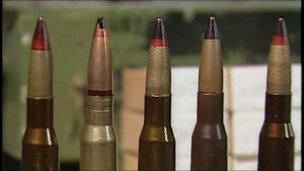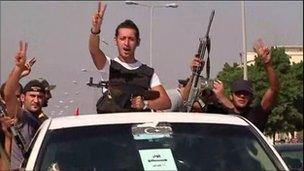A chance for Libya to build better relations with the outside world
- Published

Libya supplied weapons to the IRA during the 1970s and 1980s
If the dramatic rebel advances around Tripoli finally spell the end of Col Gaddafi's regime, it should usher in a new chapter in the political and economic relationship between Libya and the rest of the world.
For Northern Ireland, it would mean the conclusion of four decades during which the Libyan leader was acknowledged as the IRA's principal arms supplier.
The colonel came to power in 1969 - the same year the troubles ignited in Northern Ireland.
After meeting the veteran Irish republican Joe Cahill, the young Libyan leader became convinced the IRA were his revolutionary comrades.
He is believed to have supplied the IRA with three shipments of weapons in the early 1970s, including rifles and rocket propelled grenade launchers.
Retaliation
Although the Libyans had a brief contact with the loyalist UDA, it was the colonel's continuing relationship with Irish republicans which played a significant role in the course of the troubles.
In 1986, Margaret Thatcher allowed Ronald Reagan to use British airbases to launch strikes on Col Gaddafi's headquarters in retaliation for the bombing of a Berlin nightclub.
A few days after the strikes, an enraged Col Gaddafi granted an interview to RTE, telling the Irish state broadcaster " generally we support the Irish cause and if I were the leader of the south of Ireland I would consider that the north is colonised and I would fight to liberate that part of the country".
He went on, urging "all the Irish youth in the south and the north" to support the "liberation struggle".
Behind the lens was local cameraman Eugene McVeigh.
He still remembers Col Gaddafi's bizarre arrival, driving himself up in a battered Peugeot.

Eugene McVeigh met Col Gaddafi while filming an interview for RTE
His interview, conducted in the bombed-out remnants of his headquarters, was characteristically long winded.
Afterwards the Libyan leader was happy to pose for photographs and presented the crew with copies of his Green book and the Quran.
Eugene McVeigh found the colonel's understanding of Irish politics to be "very black and white".
"We didn't detect any nuances," he said.
"The oppressed Irish people, the imperialist British - it was all like that."
But these were no empty threats - in revenge for the 1986 air strikes the colonel sent the IRA more arms including, crucially, Semtex explosives.
Although the French authorities intercepted 150 tonnes of weapons on board a vessel called the Eksund in November 1987, it's thought a similar quantity had already reached the IRA in a series of smaller shipments.
The weapons fuelled an upsurge in IRA attacks in the late 1980s.
Payouts
As Col Gaddafi sought greater international acceptance and the end of UN sanctions, his government agreed to pay compensation to the families of victims of the Lockerbie bombing.
But at this stage the British government didn't push for similar payouts for IRA victims, settling instead for detailed intelligence on how many arms had been supplied to the IRA.
However in recent years IRA victims, backed by unionist politicians, have been pushing for a multi-million pound compensation package.

A regime change in Libya could mean business opportunites for companies in Northern Ireland
But will a new administration be willing to compensate those harmed by Col Gaddafi's Irish policies?
The DUP's deputy leader, Nigel Dodds, who visited Libya in 2009, says contacts have already been made with the Libyan transitional council and he remains "very confident" that progress can still be achieved.
Those campaigning for compensation want those who form the new Libyan regime to contribute to a "humanitarian programme for peace and reconciliation" which would include business investment, community development and the resolution of existing claims by individual UK citizens.
The future of the compensation case remains unclear.
But Northern Ireland businessmen were amongst the foreign workers who had to leave Libya when the rebellion began earlier this year.
They will be hoping that a resolution to the civil war will bring a chance to pursue more positive opportunities in the future.